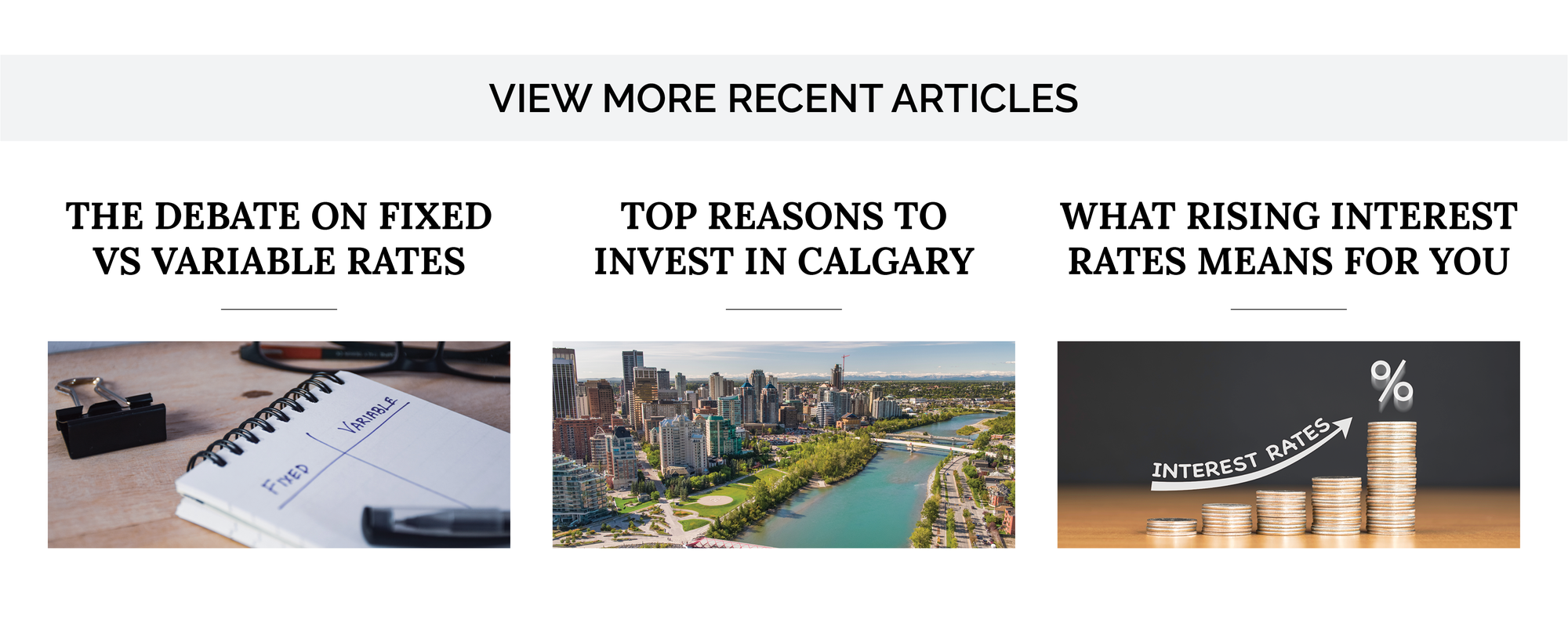
If you have been keeping an eye on the for sale signs in your area, you have likely noticed that Calgary’s real estate market is on fire! Over the last few years, we have experienced incredible in-migration and a strong economy, both of which have led to strong appreciation in our real estate sector.
A strong real estate market has meant different things to different people depending on their situation. Certainly sellers have been enjoying the strong seller’s market conditions, but things have been less enjoyable for buyers who have been faced with many competing offers and quickly escalating values. An intensely competitive market, along with higher interest rates, have made things especially challenging for first-time buyers, who are also feeling the squeeze in the rental market.
Another hot topic these days is Calgary's proposed “Blanket Rezoning” bylaw. If you aren’t aware, the city has proposed to end so-called “exclusionary zoning,” which only permits single-family residences and to rezone the entire city to a base of R-CG, R-G, or H-GO - all of which allow for townhouse development along with secondary suites. Certainly there is a lot of opposition to this proposal, and the final public hearing on April 22nd should be an interesting one to watch. Most industry experts are expecting the vote to pass, which would allow for higher-density development across the city. Of course, this is expected to affect different communities and types of properties in many different ways. We have been talking a lot about this as a group and are always happy to chat if you have questions or concerns! Scroll to the bottom of this post for more information on this, or you can read more about the planned rezoning in another blog post we did HERE or the City's website HERE.
- Frances, Thomas, & Team
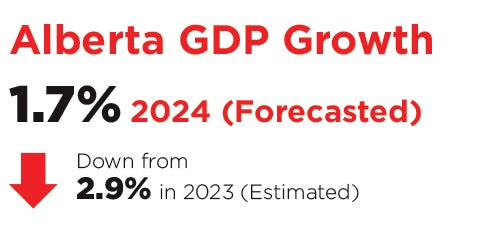
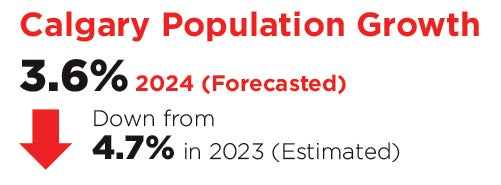

Source: RBC Economics Financial Market Forecasts December 2023

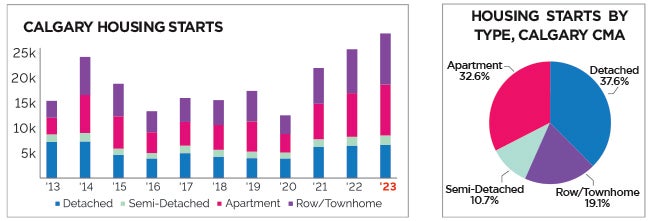
Source: CMHC, Statistics Canada

Source: CREB 2024 Forecast Report






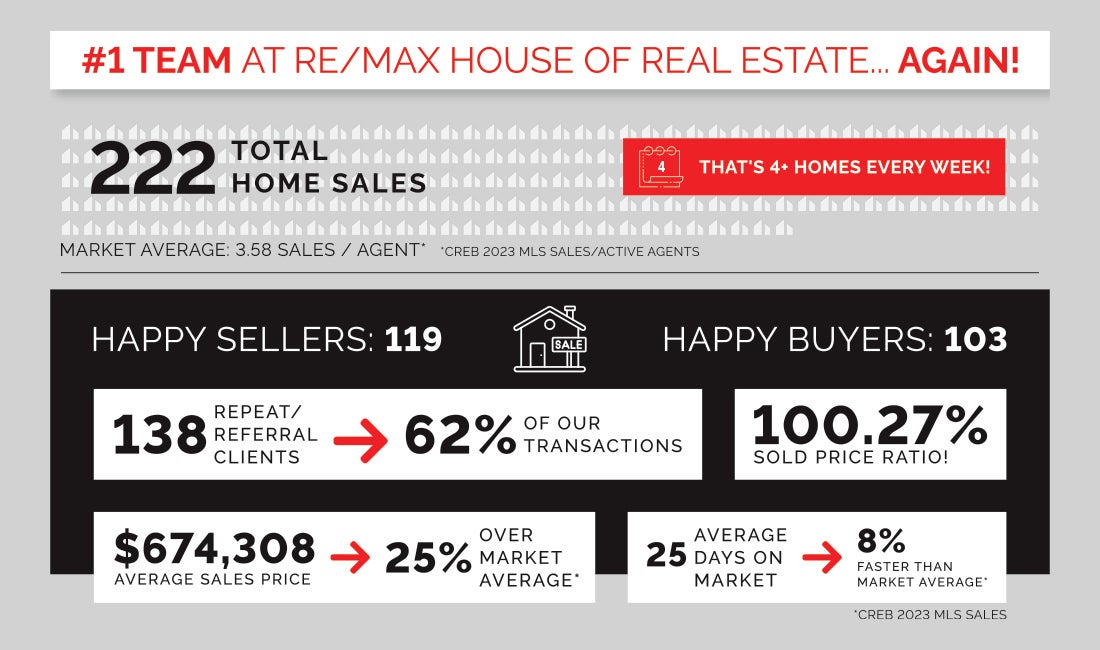
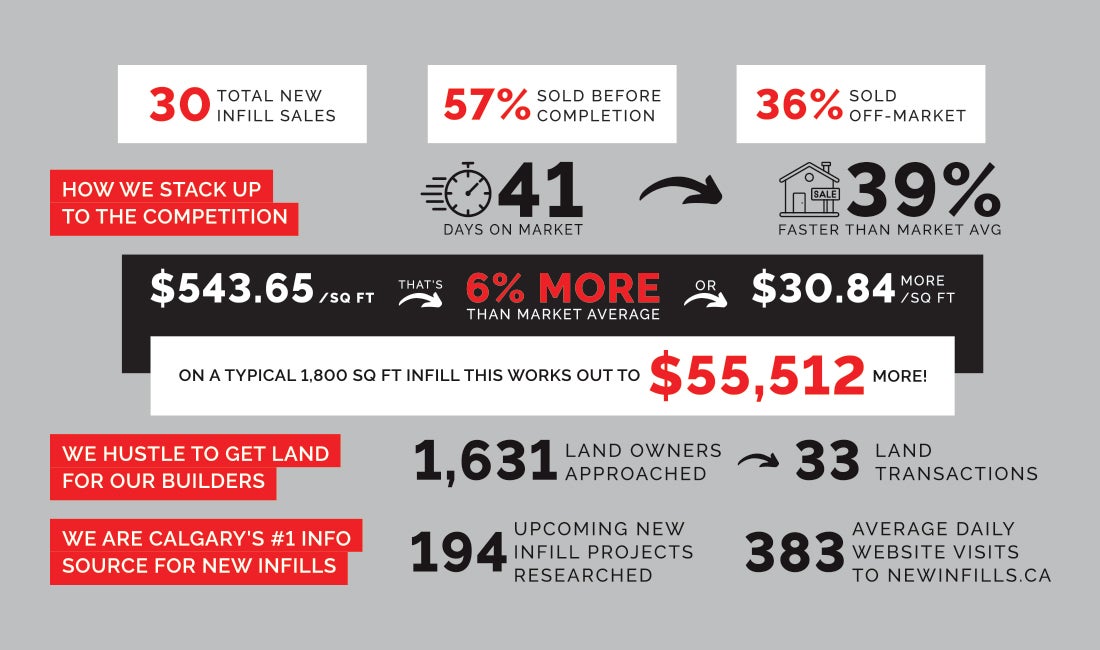
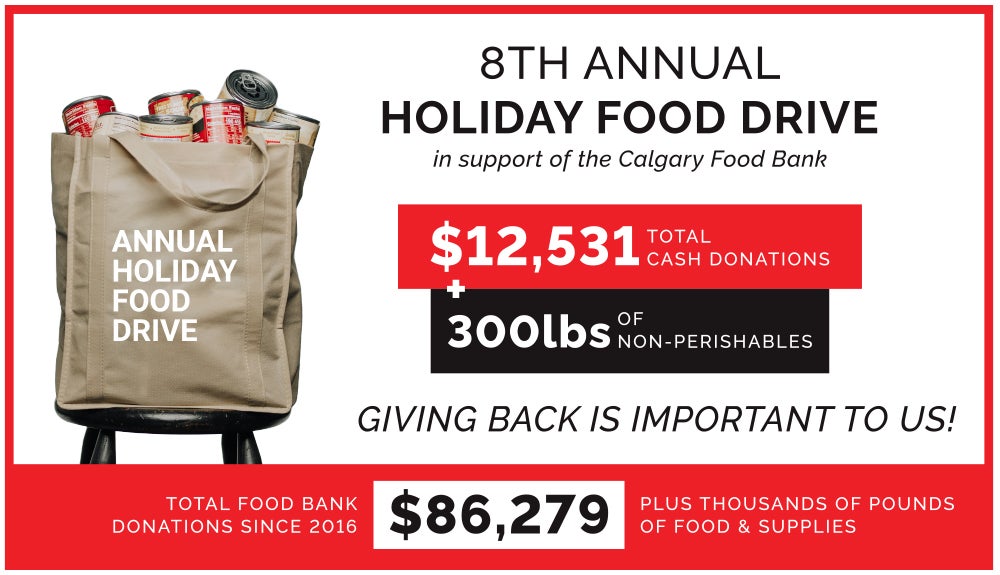
CALGARY VS. EDMONTON: A COMPARISON

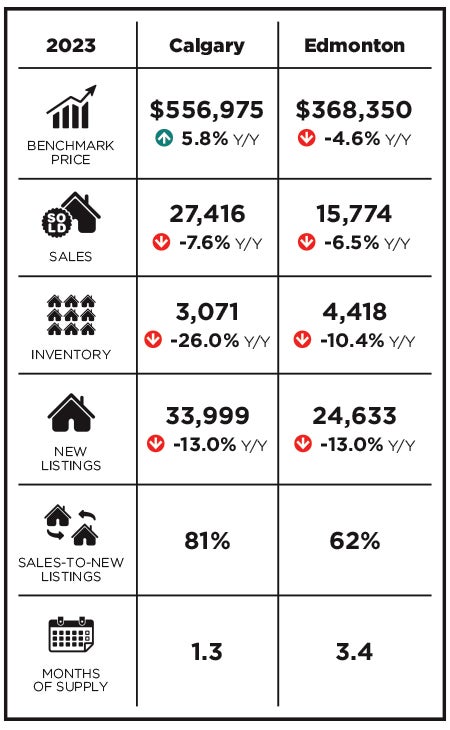 While Alberta has experienced significant population growth due to international and inter-provincial migration, the housing dynamics in the province’s two largest cities have differed.
While Alberta has experienced significant population growth due to international and inter-provincial migration, the housing dynamics in the province’s two largest cities have differed.
MAKING HEADLINES
THE DEBATE ON RE-ZONING CALGARY
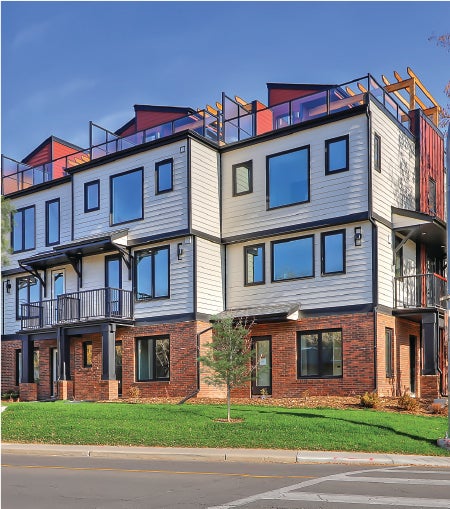 With the uptick in migration and immigration to our City, it’s undeniable that Calgary is in need of more housing. One proposed solution that is currently on the table and actively being debated at City Hall is the new proposed “Blanket Rezoning” bylaw that would establish a new city-wide base zoning of R-CG, R-G, or H-GO, all of which allow for a much higher density than is currently permissible under our mostly R-C1 and R-C2 land designations. This is meant to reduce red tape and speed up the development of more housing, primarily throughout the inner-city and existing communities.
With the uptick in migration and immigration to our City, it’s undeniable that Calgary is in need of more housing. One proposed solution that is currently on the table and actively being debated at City Hall is the new proposed “Blanket Rezoning” bylaw that would establish a new city-wide base zoning of R-CG, R-G, or H-GO, all of which allow for a much higher density than is currently permissible under our mostly R-C1 and R-C2 land designations. This is meant to reduce red tape and speed up the development of more housing, primarily throughout the inner-city and existing communities.
CREB 2024 ECONOMIC FORECAST
Courtesy of the Calgary Real Estate Board (CREB)
CALGARY ECONOMIC SUMMARY
High lending rates and inflation are expected to impact consumers in Alberta. However, economic growth is expected to outperform most other provinces primarily due to the recent gains in the energy sector and population growth.
Alberta's relatively strong growth is also being supported by gains in other industries, including technology, aviation, hydrogen, carbon capture and storage and renewables. The province is expected to outperform most others, primarily due to the resilience of its energy sector.

Source: CREB 2024 Forecast Report
KEY ECONOMIC FACTORS
POPULATION
The recent shift in international and inter-provincial migration is the primary driver of the tightening seen in the housing market over the past several years.
Recent estimates from Statistics Canada show that Calgary accounts for nearly half of the province's population growth and is seeing its population grow faster than the provincial total. Forecasters expect that in 2023, Calgary’s population will grow by nearly five percent and that this will slow to a four percent growth rate in 2024.

Sources: Statistics Canada, Conference Board of Canada Forecast
LENDING RATES & INFLATION
It is expected that the Bank of Canada might initiate a reduction in lending rates in the latter part of the year. While rates are anticipated to decrease to four percent by the end of 2024, they will still be considerably higher than pre-pandemic levels.

Source: RBC Economics Financial Market Forecasts December 2023
EMPLOYMENT
Calgary has benefited from robust employment growth over the past several years, with the professional, scientific, and technical services sector being the primary contributor in 2023.

HOUSING STARTS
In the Calgary census metropolitan area, 2023 housing starts are on pace to hit record levels. Most starts have been in the apartment sector, with over half of the units targeted toward purpose-built rental.

Source: CMHC, Statistics Canada
RENTAL RATE GROWTH

Source: CREB 2024 Forecast Report
2023 CALGARY MARKET REVIEW
What a year 2023 turned out to be, with exceptionally strong demand and a decline in new listings combined to make for very tight inventory levels. 2023 wrapped up the year with an appreciation of over 7% Y/Y in our single-family sectors and over 13% Y/Y in our multi-family sectors. Although total sales in 2023 were lower than in both 2021 and 2022, this is not due to a lack of buyers but rather a continued lack of available homes on the market. The tightest supply, and therefore the most intense markets in 2023, were in the entry-level price points: single-family homes under $700,000 and townhomes under $500,000.
Although every market sector has seen a shift in seller’s market conditions over the last few years, the award for most improved definitely goes to the apartment condo sector. Now firmly in seller’s market territory, this is a huge shift from just a few years ago when excess inventory made for a substantial buyer’s market, resulting in many years of price declines. The apartment condo sector is now performing very well, and prices are bouncing back very quickly.
DETACHED SECTOR

SEMI-DETACHED SECTOR

TOWNHOME SECTOR

APARTMENT SECTOR

LOOKING AHEAD TO 2024
The Calgary Real Estate Board (CREB) is forecasting moderate price appreciation of approximately 6-7% throughout the city of Calgary in 2024. However, we believe this estimate may be a little light. So far, we have already seen price appreciation through Jan and Feb to the tune of approximately 3% compared to the end of 2023. Given our low inventory levels and continued demand for housing from both local buyers as well as those moving to Calgary from more expensive housing markets like Toronto, we believe this price appreciation will continue through Q2 and potentially even the remainder of 2024. Although nobody has a crystal ball, we expect that if interest rates do start to come down later in the year, this will only fuel more sales activity and price growth overall. Fuel on the fire, or so they say!
2023 NEWINFILLS MARKET UPDATE
The Calgary new infill market continues to show exceptional strength post-pandemic, with strong demand for new housing and price appreciation throughout the inner city. In the last 2 years, prices have risen by approximately 16% in the single-family sector and 22% in the townhome sector. Although this price growth has helped to offset rising costs for both land and construction, margins remained relatively thin for builders and developers in 2023.
The single-family new infill sector ended the year with 391 sales, the highest level recorded in nearly 10 years and up 37% compared to 2022. Despite considerable construction activity, strong sales have led to relatively low inventory levels in the single-family sector. 2023 saw an average of 151 homes for sale, up 21% compared to 2022 but down 28% compared to long-term averages for the city.
The new infill townhouse sector, on the other hand, has continued to experience soft sales due to challenges with supply. 2023 saw just 66 new townhome sales, down 14% from 2022 and 32% compared to long-term averages. Although townhouse construction is booming throughout Calgary, the vast majority of this construction is for purpose-built rentals due to recent government financing programs aimed at increasing the supply of new rental products.
SINGLE FAMILY NEW INFILLS

NEW INFILL TOWNHOMES

URBAN UPGRADE 2023 PERFORMANCE STATS

2023 NEWINFILLS STATS
Our team knows the infill market!

2023 HOLIDAY FOOD DRIVE

AGENT SPOTLIGHT
We sat down with one of the newest members of our team to ask a few questions...
 Why did you get into real estate?
Why did you get into real estate?
Because I wanted to become an expert in an industry that I love, and I love real estate.- What did you do before becoming an agent?
I was a restaurateur and owned a cafe & restaurant in Calgary. - What is your focus when working with clients?
I actively listen and seek to understand every client's wants and needs while respecting their budget. I know to be patient when a client embarks on the buying or selling journey, as every situation is different. - What do you love most about working in real estate?
I love making new friends and seeing how happy and relieved clients are once they've bought or sold. - What’s your #1 tip for a successful sale?
Be prepared, be honest, and communicate everything important to your Realtor so they can help you. - What’s it like being on the Urban Upgrade & NewInfills team?
It's been amazing so far! They're supportive, smart, and fun. And I especially love that we have fundraising events to give back to the community.
Want to learn more about our agents?
Read everyone's full bios on Our Team page!
IN THE NEWS
CALGARY VS. EDMONTON: A COMPARISON

Calgary and Edmonton have always been directly compared when it comes to many things, including real estate. Because of this, we are quite often asked about Edmonton’s market, especially lately with the crazy market conditions experienced in Calgary. After all, we see a lot of movement between Alberta’s two largest cities! Here, CREB explains some of the differences between the Calgary and Edmonton real estate markets in 2023:
 While Alberta has experienced significant population growth due to international and inter-provincial migration, the housing dynamics in the province’s two largest cities have differed.
While Alberta has experienced significant population growth due to international and inter-provincial migration, the housing dynamics in the province’s two largest cities have differed.Calgary is perceived to be drawing a larger share of inter-provincial migration, supporting some of the sales growth in the higher-priced market segments while simultaneously exerting pressure on supply. The limited supply relative to demand in Calgary played a role in the annual benchmark price gain of nearly six percent. However, Edmonton prices are forecast to rise this year, as recent shifts to tighter market conditions will persist, given expected gains in employment and migration.
In contrast, Edmonton began the year with higher supply levels that persisted throughout the spring market, preventing home prices from rebounding. On an annual basis, Edmonton saw a nearly five percent decline in the benchmark price in 2023.
Even though we're still near the beginning of 2024, conditions remain tighter in Calgary compared to Edmonton. Despite recent shifts in the Edmonton market, the expectation is that price growth in Calgary will still outpace growth in Edmonton in 2024.
MAKING HEADLINES
THE DEBATE ON RE-ZONING CALGARY
 With the uptick in migration and immigration to our City, it’s undeniable that Calgary is in need of more housing. One proposed solution that is currently on the table and actively being debated at City Hall is the new proposed “Blanket Rezoning” bylaw that would establish a new city-wide base zoning of R-CG, R-G, or H-GO, all of which allow for a much higher density than is currently permissible under our mostly R-C1 and R-C2 land designations. This is meant to reduce red tape and speed up the development of more housing, primarily throughout the inner-city and existing communities.
With the uptick in migration and immigration to our City, it’s undeniable that Calgary is in need of more housing. One proposed solution that is currently on the table and actively being debated at City Hall is the new proposed “Blanket Rezoning” bylaw that would establish a new city-wide base zoning of R-CG, R-G, or H-GO, all of which allow for a much higher density than is currently permissible under our mostly R-C1 and R-C2 land designations. This is meant to reduce red tape and speed up the development of more housing, primarily throughout the inner-city and existing communities. WHAT DOES THIS ACTUALLY MEAN?
The majority of the city of Calgary is currently set up under so-called "exclusionary zoning", meaning most areas of the city are zoned to allow only single-family homes.
A city-wide base rezoning to R-CG, R-G, and H-GO will allow the building of single-detached, semi-detached, and row houses ANYWHERE in the city. For most R-C1 and R-C2 communities, this means that new developments could start to be seen at 2-4 times the current density.
OUR THOUGHTS ON WHAT COULD HAPPEN IF THE BYLAW PASSES
1. Some areas and types of housing will be more affected than others. Citywide rezoning for townhome development doesn't guarantee widespread redevelopment and high-density construction in every community. For example, more recently built communities, like Chaparral and McKenzie Towne, are unlikely to be significantly affected in the short term due to unsuitable lot sizes and community characteristics.
2. Blanket rezoning will primarily affect the inner city. City-wide rezoning won't drastically alter the development of new communities. Some areas within these communities will continue to focus on single-family homes. In contrast, older inner-city neighbourhoods with large lots and aging homes, such as Altadore, Killarney, West Hillhurst, and 1950s communities like Haysboro and Glendale, offer significant redevelopment potential at higher densities due to their age and lot characteristics.
3. Blanket rezoning will primarily affect lower-priced communities. More expensive inner-city estate communities like Mount Royal and Britannia are likely to be less affected by high-density housing development due to the financial impracticality of these projects for developers. These areas are expected to maintain a focus on upscale single-family homes due to a significant difference in land costs compared to other cheaper inner-city communities like Glenbrook. Where multi-family development may occur in an existing estate area, the finished product is expected to be of a very high spec, and certainly not at entry-level pricing.
No zoning will change without Council approval. A FINAL public hearing date has been set for April 22, 2024. This is when the Administration will present a recommended approach to citywide rezoning to the Council. The public may attend the public hearing in person or submit written input. Learn more at: www.calgary.ca/planning/projects/rezoning-for-housing.html

